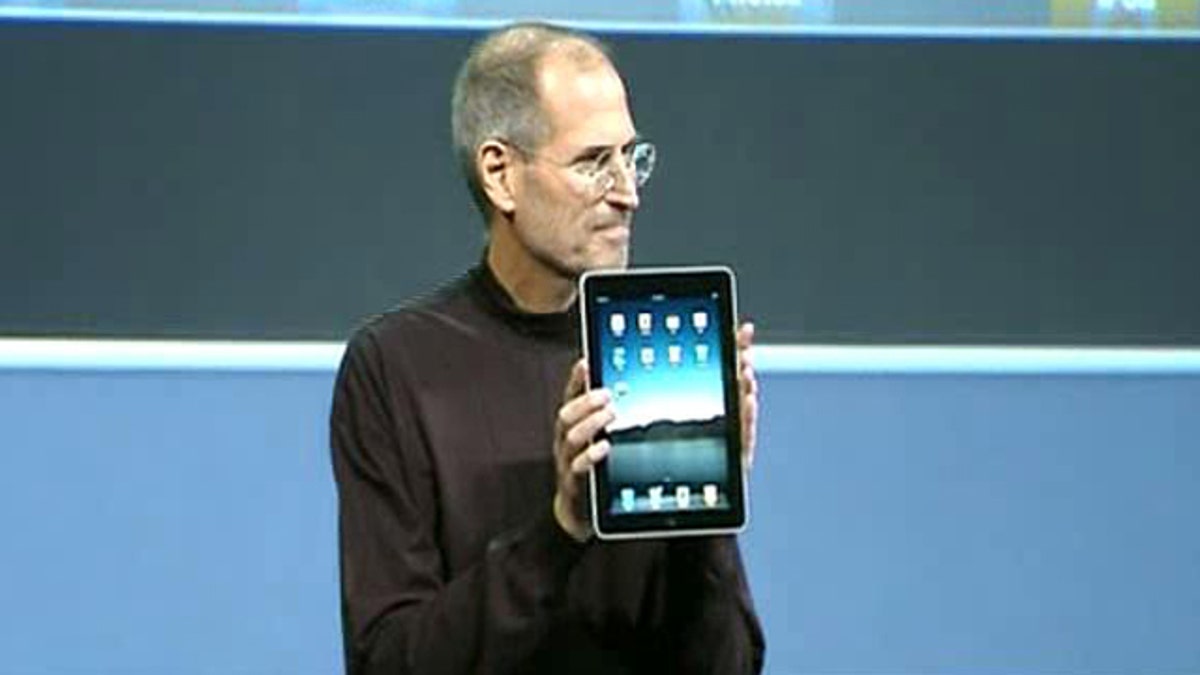
During his keynote speech, Steve Jobs shows off the iPad at its January debut. (FoxNews)
In an open letter posted to the company's website, Apple CEO Steve Jobs finally explains why he has refused to let Adobe's popular Flash videos run on iPhones and iPads.
The letter, titled "Thoughts on Flash," offers six reasons why the company has restricted prevented Flash from running on iPhones, iPods and iPads, reasons that run the gamut from philosophical issues about the nature of closed and open platforms to simple complaints about performance and the frequency of crashes.
Steve's statement comes on the heels of a very public dispute between the two technology giants; earlier in the month, complaining about a developer agreement from Apple that makes it a violation of terms to use a non-sanctioned development language, Adobe Flash evangelist Lee Brimelow registered his disgust with Apple.
"Speaking purely for myself, I would look to make it clear what is going through my mind at the moment. Go screw yourself, Apple."
Apple did not comment on Brimelow's words, but the letter by Jobs is clearly the company's official response. In it, Jobs begins by questioning the closed nature of the product, noting that "Adobe’s Flash products are 100% proprietary. They are only available from Adobe, and Adobe has sole authority as to their future enhancement, pricing, etc." Closed products stifle innovation, Jobs argues.
Many Apple products are proprietary as well, of course, notably the iPod -- which works only with Apple's iTunes software, and the App Store that the company tightly controls. But with regard to Web standards, Jobs believes in open standards, notably HTML5, Flash's chief competitor.
"HTML5 is completely open and controlled by a standards committee, of which Apple is a member," he explains.
Jobs also suggests that Flash is old, describing videos encoded through with other compression technologies as H.264 as "more modern formats." The largest issue seems to be the performance problem. Jobs describes Flash as "the number one reason Macs crash."
He also complains about performance. But the main issue?
"We know from painful experience that letting a third party layer of software come between the platform and the developer ultimately results in sub-standard apps and hinders the enhancement and progress of the platform," Jobs argues.
"We cannot be at the mercy of a third party deciding if and when they will make our enhancements available to our developers."
Adobe was not immediately available for comment on Jobs' letter. But PCMag.com editor in chief Lance Ulanoff wasn't surprised that Jobs fought back so publicly. "There's tremendous frustration on both sides, and a lot is at stake," he told FoxNews.com, describing Jobs' missive as "well reasoned...with the occasional zinger in there."
But more than anything, Ulanoff wonders if Apple's public scolding of Adobe may be the beginning of the end for the Flash technology.
"This seemingly well-reasoned letter from one of the most important technology companies in the world can have devastating effects" on future development, he pointed out, both by independent developers and by Adobe itself.
"It's an incredible attack on Flash, and could shake its very foundations," he said.








































